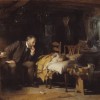Palliative medicine as a specialty

A new report has just appeared from the excellent Atlantes team at the University of Navarra in Spain. It sets out a detailed description of the development in Europe of palliative medicine as a field of specialisation. This is a challenging issue to study, in a context where modes of accreditation, licensing and associated procedural… Continue reading






